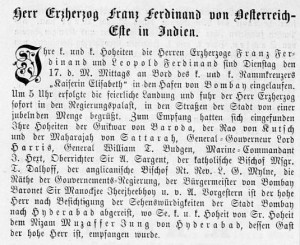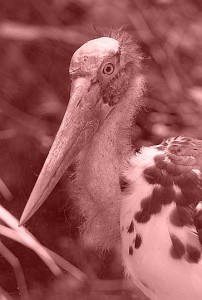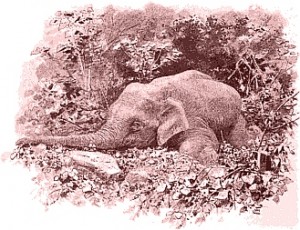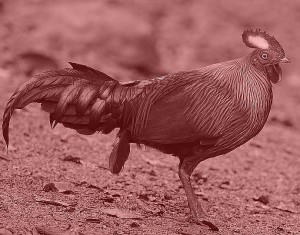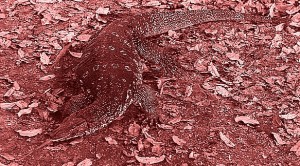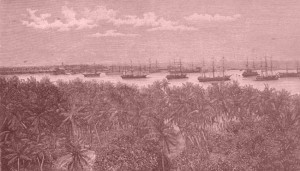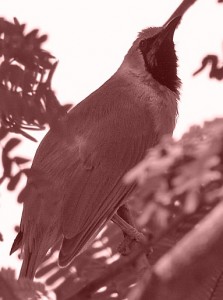Even though the council of the experienced hunters had decided to leave camp early to have time for multiple hunts, it was already 10 o’clock, due to fatal propensity for unpunctuality and time waste of the local Europeans and also the natives, when we finally did move. The time to departure was shortened by a sport new to me — an improvised falcon hunt. Some Hindus from Hyderabad had brought along trained falcons and a captured heron which they set free in the camp. As soon as the heron had reached a certain distance, they removed a falcon’s cap and swiftly the falcon flew towards the escaping heron, ascended up into the sky and then descended like a flash upon the heron striking it with its claws to the ground. Then it struck the heron’s back with its claws and beak and started to gorge. Two more falcons were launched into the air. They expertly caught a dead crow thrown up in the air.
But more important matters were awaiting us. Again we were promised much: the tiger must have certainly killed, they must certainly be between two of the tracking groups as their roars had been heard.
We rode on the same path as the day before until we reached the large tamarind where we again held a meeting for consultation. Every one of us was selected to mount on an elephant. It was the first time I sat in a hâuda. A peculiar, strange feeling to hover above the ground in a tub-like container on the back of a giant animal. With every step of the elephant it moved back and forth like in a ship. Even the mounting is difficult but not without comic effects: The elephant kneels down. One steps up over the rear legs on the inclined back and then hoists oneself into the hâuda. The elephant then stands up again, first with the front legs, then follow the short rear legs, so that the hâuda is almost horizontal but it is recommended to hold on tight to avoid being swept out.
The elephant is led by the Mahawat who sits on the animal’s head and indicates both speed and direction with a sharp hook (Gadschbag) , pricking the skin now right now left. The animal and its guide are living together in harmony despite the often un gentle treatment of the animal. The Mahawat talks without interruption with the smart animal and it fulfills with all the guide’s wishes, in sitting down on command, lifting one foot in the air to let the Mahawat mount the elephant, to raise the trunk and lower it, and it does whatever the guide demands. If the elephant turns naughty which happens from time to time, it is kicked sharply in the trunk which is answered by a trumpet-like cry. When the elephant come to a stream, they drink with their trunks or they pump it into their mouth so that if the heat is harsh and the flies to vexing, they can take some of the water from the mouth with the trunk and spray it over their body. Some Mahawat let their animals lay down and take a bath like this. Against flies, the elephants are very sensitive despite their thick skin: They chase them away with a large twig which they tear from a tree. One should not assume an elephant will stand still even for a minute. It will chase away flies that harry it or eat grass or leaves or swivel the trunk in the air — with one word, the hauda is permanently moving what makes it extraordinarily difficult to shoot safely from it.
At a small pond, the shikaris showed me a large tiger track that were said to be at least two days old. On a hill covered with bushes, we were placed in line at a distance of around 100 m each: first Stockinger and Prónay, then Wurmbrand, Clam, me, at the right flank Kinsky.
In front of our positions, there were natives sitting on tall trees reaching out of the bushes whose task it was to indicate the presence of a tiger with a large red cloth and point in the direction it was moving,
Due to our bad calculations, we had to wait in our positions for one and a half hours before the tracking started, which was not appreciated given the heat and the constantly shifting elephants. Finally the signal was given to start the hunt: Four drumbeats. Soon we could hear the infernal cries of the trackers around 1000 m away, together with shots fired into the air, trumpet blasts, drumbeats and the screed of ratchets. With utmost attention we were waiting for the tiger to appear out of the jungle at any moment now. What did not appear, was a tiger. Instead we saw the trackers come closer — they were about 300 of them, constantly moving and exceedingly cautious, usually one behind the other standing in the most convenient spots, as these people obviously have great respect about tigers and are unwilling to advance before they have thrown a stone into the next bush so that even a small distance of a few 100 meters took a relatively long time for them to cover.
The natives of this region did not make a good impression on me as they seemed to be not very courageous, unreliable, not skillful and rather careless. If one wants to explain something to them or give them an order, it takes a long time as all shout and cry amongst themselves and then do the opposite of what they were requested to do.
As soon as the trackers appeared, they had a long tale to tell: The tiger had been in the jungle, one man had seen it but the tiger managed to escape – a tale I thought was fiction. But we were at our wit’s end. We wanted to continue the hunt but our hunting director explained to us that he had first to discuss this with the shikaris, then send them out again. Besides, the trackers would require a pause which I found astonishing as they had started but one hour ago. Finally another lunch helped to gloss over the local misbehavior. Having lost further precious time in this unnecessary procedure, we continued the hunt at half past four o’clock to chase after a very certain track, at least they said so.
We rode on the elephants into a pleasant valley surrounded by steep rocky sides when one shikari came running, gesticulating wildly. He reported that he had heard the tiger roar nearby. At the same time, he showed the calf allegedly killed just now but whose decomposition proved the shikari an instant liar. It looked like it had died at least six days ago and had nearly completely up to the bones been eaten by vultures . On a tree nearby, twenty or more large vultures cared little about our presence and continued to sit there quietly watching us.
As the elephants could not stand on the large rocks, we climbed up on mighty trees on whose upper branches were laid poles to construct a most airy place which offered the opportunity to sit down as well provide a bit of cover by the leaves on the branches. We were set up in a half-circle of shooters and waited for the action to begin. The tracking completely looked like the first one, only it took even longer as the trackers displayed utmost respect towards the ravine where it was said that the calf had been killed. They shot into the ravine for not less than an hour and made all kinds of noice before they dared to enter it. The sun had set a long time ago, the moon and the stars were up on the sky when the trackers finally reached our position.
Shortly before that a large owl had flown straight out of the rock cliff to my tree. With a bullet I shot the bird which, placing itself a bit above my head, had looked at me astonished with its large yellow eyes. Soon thereafter, a mongoose ran past my tree but I failed to shot the timid animal.
It was soon getting dark so that we on our elephants had to return to the camp. From there a number of Hindus with torches were marching towards us. The failure of the hunt had a bit diminished our good mood so that Clam excited everyone to laughter when he took one of the torches and improvised some kind of Arabian fantasy together with Prónay.
I can not explain why this hunting expedition, despite extensive and expensive preparations, ended without success. I believe, however, not to be completely wrong if I suspect the reason for the failure lay mostly in the dullness and unreliability of the natives as well as the leadership of the expedition was assigned not only according to hunting skills but personal relations what might easily happen given the size and complications of this expedition.
Tomorrow we will have to leave camp and dismantle it. I had no proud feeling about having neither seen nor shot the long-awaited tiger. Still I had some sentiment of satisfaction, as the romantic stay in a tent city, the life in open air, had presented a rich contrast between civilization and wilderness and offered the opportunity to get accustomed to the natives in a casual manner. Thus, the three day expedition in the hunting camp of Tandur was in total a very interesting episode.
Unfortunately two of our company were sick: Kinsky as well one marine who we had taken along from the „Elisabeth“, both were heavily stricken by fever,
Links
- Location: near Tandur, India
- ANNO – on 23.01.1893 in Austria’s newspapers, The press is already filled with news about the upcoming wedding of Franz Ferdinand’s sister. The king of Württemberg and his wife already arrived yesterday in Vienna for this occasion and were received by the Emperor and the Viennese high society.
- The k.u.k. Hof-Burgtheater is performing a drama „Frau Susanne“, while the k.u.k Hof-Operntheater is repeating the performance of the ballet „Excelsior“.
